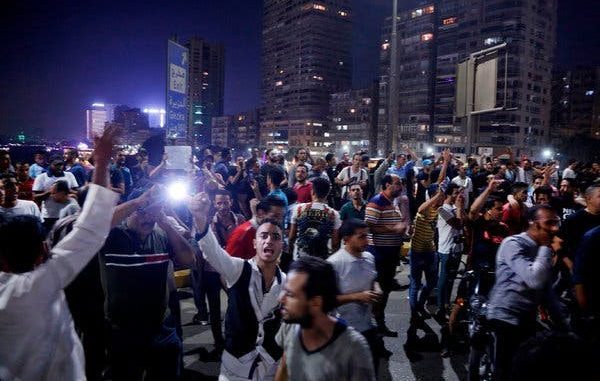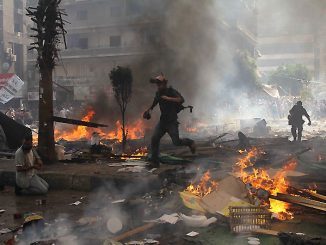
At the UN general assembly in New York, Donald Trump lauded Mr Sisi as ‘a great leader’ when asked about the protests; not a great surprise since he had previously reportedly hailed him as ‘my favorite dictator’.
While foreign leaders buddy up to Abdel Fatah al-Sisi, his people endure a brutal crackdown on rights, the Guardian’s editorial on Thursday read. Also, the U.S. Working Group on Egypt issued a statement two days ago called on the U.S. administration to restate clearly Washington’s support for peaceful protests in Egypt.
Even before Egyptian authorities warned that they would “decisively confront” any protests that take place on Friday, it was evident that it would require extraordinary courage to answer the call to the streets. Abdel Fatah al-Sisi’s regime has repeatedly shown its utter ruthlessness since seizing power six years ago in a coup. Security forces killed thousands of people protesting against the takeover. The country has locked up 60,000 political prisoners. Executions have soared this year.
Yet hundreds of people did demonstrate in cities including Cairo, Suez and Alexandria last week. The authorities responded with teargas, rubber bullets, beatings and live ammunition. Almost 2,000 people have since been arrested – more than are thought to have taken part. They include several prominent figures who do not appear to have been involved in any way, including the internationally recognized rights lawyer Mahienour el-Massry, who was defending protesters; the journalist and opposition politician Khaled Dawoud; and Hazem Hosny, a former spokesperson for Sami Anan, the former military chief of staff detained since he tried to challenge Mr. Sisi for the presidency last year.
The demonstrations were triggered by videos posted on social media by an exiled Egyptian called Mohamed Ali, claiming to expose the corruption of top military figures which he says he witnessed as a builder working on their properties. They resonated with a population ground down by relentless repression and the struggle to get by. Egypt may be an emerging-market darling, but the macroeconomic picture does not align with people’s experiences. Austerity measures imposed under an IMF loan program have been punishing. Real incomes have fallen and the poverty rate has risen again, to just under a third of the population. While the regime has persuaded a sizable chunk of the public that it is a bulwark against further turmoil as well as political Islam, others have had enough.
At the UN general assembly in New York, Donald Trump lauded Mr. Sisi as “a great leader” when asked about the protests; not a great surprise since he had previously reportedly hailed him as “my favorite dictator”. European leaders have been more tasteful in their remarks on the Egyptian leader, but they too have made their peace with him, seeing him as essential to limiting migration and as a bulwark against terrorism, and – in France’s case – an enthusiastic purchaser of arms and security equipment. There is no sign that the British prime minister, Boris Johnson, even mentioned the demonstrations when they met.
They should pay more heed. It is still unclear why the protest sites had not been put under tight security last Friday, as they had been after previous calls for protests, and why it was a little while before authorities cracked down. Some wonder if parts of the system are unhappy and wanted to send a message to their boss. (If so, his trip to the US suggests it went unheard.) Another explanation, perhaps more plausible, is that they were taken by surprise: when repression is harsh and wholesale, who expects people to object?
Most of those detained appear to be young; too young, in most cases, to have been involved in the 2011 revolution. That is a reminder that an increasingly youthful population sees little hope of any improvement in its circumstances. Mr. Sisi’s many friends overseas have made a bad call. They should make it clear to him that a bloody crackdown will not be tolerated. They should do so to protect the basic rights of Egypt’s people. Closing the safety valve only means the pressure builds.
Statement by the U.S. Working Group on Egypt
The Working Group on Egypt (a US bipartisan group of foreign affairs experts formed in 2010), on September 25, 2019, issued a statement calling on the U.S. government officials to restate clearly the United States’ support for peaceful protests in Egypt.
The statement, signed by Robert Kagan (co-chair), Michele Dunne (co-chair), Reuel Gerecht, Amy Hawthorne, Neil Hicks, Thomas Hill, Sarah Margon, Stephen McInerney, Andrew Miller, Tamara Wittes, Ken Wollack, reads as follows:
[As members of the Working Group on Egypt, we call on U.S. government officials to restate clearly the United States’ support for peaceful protests in Egypt. Authorities there have arrested more than 1,400 people after peaceful anti-corruption protests broke out in 14 Egyptian provinces on September 20 and 21.More protests are possible in the coming days and weeks. In Egypt, President Trump’s statements after meeting with President Abdel Fattah al-Sisi on September 23 are being interpreted as giving Sisi a green light to use force against demonstrators and to engage in a broader crackdown.
We ask U.S. officials in the executive and legislative branches to make clear that the United States continues to stand for the following principles regarding demonstrations in Egypt, just as it has done recently regarding protests in Russia, Hong Kong, Iran, and Sudan:
Egyptians have the right to protest peacefully, and to exercise that right without fear of state violence or other retribution.
The military and police should show restraint, avoid conflict, and remain committed to the protection of the people.
All detained peaceful protesters, journalists, lawyers, and human rights defenders should be released immediately and any charges against them dropped.
Robert Kagan (co-chair)
Michele Dunne (co-chair)
Reuel Gerecht
Amy Hawthorne
Neil Hicks
Thomas Hill
Sarah Margon
Stephen McInerney
Andrew Miller
Tamara Wittes
Ken Wollack]



